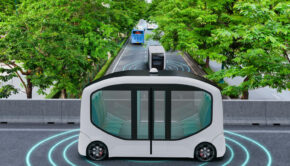How Self-driving Car Technology is Making the World Safer
Autonomous driving technology is taking over the automobile industry, but what does that mean for your life and limb (and those of other road users)?
Is a moving car with an empty driver’s seat really as safe, or even safer, than one with a human controlling it?
At first glance, it may seem like autonomous technology, like any other technology is prone to the occasional glitch, bug and error and this can prove to be fatal for road users. While that may be a good argument, it presents a pigeon-hole view of the whole picture.
And the whole picture depicts a future rife with autonomous cars, safer than the present. Let’s the arguments for and against autonomous vehicles one-by-one:
Arguments for autonomous vehicles
1. Autonomous cars aren’t prone to lapses in concentration and judgment
At first glance, there seems to be plenty of points available against this point, such as the existence of glitches, bugs et al. which might make this a weak argument.
However, consider this: AI will never feel drowsy, will never gulp a pint or two too much of scotch before sitting behind the wheel, it’ll never crash into a divider because it was thinking about its boss rude behavior.
While AI may be prone to problems of its own, it’s not prone to human error which is the cause for almost 95% of accidents.
2. They can react to situations faster
A distracted motorist is cutting into your lane. A texting teenager is running a red light. A drunk driver is coming head-on towards you.
All these are situations which test a human driver’s reflexes and judgment to the max. Unfortunately, your reactions can be the difference between reaching home safely and reaching the ER on a stretcher.
Cue AI in autonomous vehicles. It can react faster than before you can think you can think of responding and this slight reduction in reaction time could potentially save the lives and limbs of road users.
3. Autonomous vehicles are part of an omniscient brain
Autonomous vehicles, if not already, will soon be talking to each other. This has considerable safety benefits for road users.
Interconnected cars will lead to the development of a universal database equipped with information about road conditions, safety hazards, speed limits, etc., things the Average Joe behind the wheel wouldn’t know or would choose to ignore.
4. Autonomous technology is always improving
As technology gets smarter (and people get dumber as a consequence), autonomous cars are bound to improve minute-by-minute. As already mentioned, autonomous vehicles are part of the universal brain, and they’re continually analyzing and learning from the vast amounts of data which they upload.
Arguments against autonomous vehicles
1. An autonomous vehicle cannot think like a human
Wait, isn’t that a good thing? Not all the time. While AI is not prone to lapses in concentration and judgment in the traditional sense (it’ll not make poor decisions before driving or let its mind drift), it can be perplexed by ambiguous situations which a human might be able to resolve better.
However, as mentioned earlier, the technology continues to improve ceaselessly and rapidly and the day isn’t very far when a self-driving car will be able to make better decisions than a human in almost every scenario.
2. An autonomous vehicle usually does not make any sound
When we think of autonomous vehicles, the first car that jumps into mind would be a Tesla. Tesla, along with pioneering the electric car revolution, is also leading the autonomous vehicle drive.
But, do you know what sound a Tesla makes? Nothing!
Since cars with internal-combustion engines usually do not incorporate autonomous technology (it’s left to electric cars since the integration of systems is much easier), autonomous cars are usually silent.
But what does that mean for you and other road users, especially pedestrians?
After all, how safe is a car which a distracted person speaking on the phone will not be able to hear coming?
Fortunately, there is a solution to this problem and governments around the world have been quick to embrace it, some even proposing a law: have sound piped through the speakers.
The idea is simple. An autonomous electric car would have speakers dedicated to the purpose of playing the sound an internal-combustion engine makes while in operation, making it audible to other road users and drawing their attention to its presence.
Of course, you’d need some pretty loudspeakers for the purpose, maybe even a subwoofer for entertainment as well. Check out the best 15-inch subwoofers here.
Conclusion
Autonomous cars are here, and they are here to stay. While there may be a few aspects to them which might make them unsafe, on the whole, they are safer than human-driven cars, and because technology keeps evolving, they are bound to get safer.
















